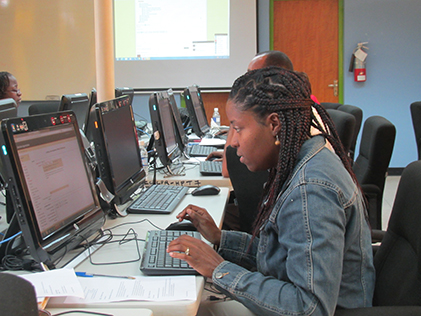
The unprecedented impact of information and communication technology and a coinciding demographic shift in many countries has created a need for skills development around the world.
It is estimated that 65 per cent of children currently in primary school will end up in new job types that currently don’t exist[1]. Developments in the fields of artificial intelligence, machine learning, robotics, nanotechnology, 3D printing, genetics and biotechnology have created new opportunities that demand new skills. Further, over 60 per cent the 2.2 billion people living in the 53 Commonwealth countries, are under the age of 29[2]. This is both a demographic dividend for Commonwealth nations and a challenge to address. For example, the highest unemployment rate amongst Commonwealth countries is in South Africa[3], which is at 25.5 per cent. But, the unemployment rate of South Africa’s youth (under 30 years)[4] is alarming at 63.1 per cent. In India, it is estimated that to remain within a 7 to 9 per cent GDP growth rate, there will need to be 500 million skilled workers by 2022.[5] This brings in a huge challenge for policy makers to rethink the education and training systems to gear towards skills development. According to the 2015 Talent Shortage Survey[6], skills shortage in Japan and India is 83 per cent and 57 per cent respectively. The situation is further compounded by a gender gap in the work force, in which there is an especially low number of women in the fast-growing areas of science, technology, engineering and mathematics (STEM)[7]. Policy makers must now rethink education and training systems with an eye towards skills development.
Recognising the importance of skills development, the Commonwealth of Learning (COL) has placed focus on skills in its current strategic plan[8]. COL is taking a holistic approach that includes the development of capacities, polices and learning materials in key skills areas through partnerships with industry and skills training institutions. COL, with its expertise in the field of technology-mediated open and distance learning, has been promoting a flexible and blended learning approach to skills development to meet the challenge of numbers; the brick-and-mortar system of skills training is simply not a sustainable model for the current demand for a skilled workforce. The flexible and blended learning approach involves a range of face-to-face and online modes to deliver training that is flexible, allowing learners to access it at their own time and pace. COL works with training providers to build their capacities to offer courses that are engaging and immersive, and which develop skills that improve the livelihoods of the participants. COL also releases learning resources, developed through partnerships, under an open license as open educational resources (OER).
Realising the potential in skilling youth in advanced ICT skills, COL has partnered with several educational institutions to develop courses that address the demand for specialist ICT professionals[9]. One such collaborative partnership is with six open universities in Africa and Asia: National Open University of Nigeria, Open University of Tanzania, Allama Iqbal Open University, Indira Gandhi National Open University, Open University Malaysia and Open University of Sri Lanka. Together, COL and the universities are developing 12 courses which will lead to two programmes for mobile application development and web application development. We expect that these courses, once developed, will be taken up by other institutions, allowing them to scale up skills development in other Commonwealth countries.
Web, mobile, multimedia, networking, cyber security, data science, business analytics and health informatics are some of the areas that are currently in demand. Over the next three years, COL will engage with partner institutions to assist in the development of courses that follow national occupational standards with a goal of improving employability, while also engaging in the monitoring of course graduates to evaluate impact. COL’s approach to ICT skills is to use a mix of video and print materials along with local skills training at partner institutions. The pedagogical approach is to use PESOS (Prepare-Explain-Show-Observe-Support) steps to focus on the key performance attributes of the skills needed to develop knowledge, skills and attitudes for training. While we engage in the process of developing quality learning materials, we also help our partner institutions to build capacities to offer high quality learner support and focus on gender equity. Join us in our endeavour to skill our youth at speed and scale.
[1]Quoted in http://www3.weforum.org/docs/WEF_Future_of_Jobs.pdf
[2]https://thecommonwealth.org/about/facts
[3]http://www.ilo.org/global/about-the-ilo/multimedia/maps-and-charts/WCMS_442905/lang–en/index.htm
[4]http://www.biznews.com/thought-leaders/2015/07/29/sa-q2-unemployment-eases-to-25-but-63-1-of-youth-remain-jobless/
[5]http://ficci.in/spdocument/20073/imacs.pdf
[6]
[7]http://www3.weforum.org/docs/WEF_Future_of_Jobs.pdf
[8]http://hdl.handle.net/11599/826
[9]http://www2.itif.org/2013-tech-economy-memo.pdf


